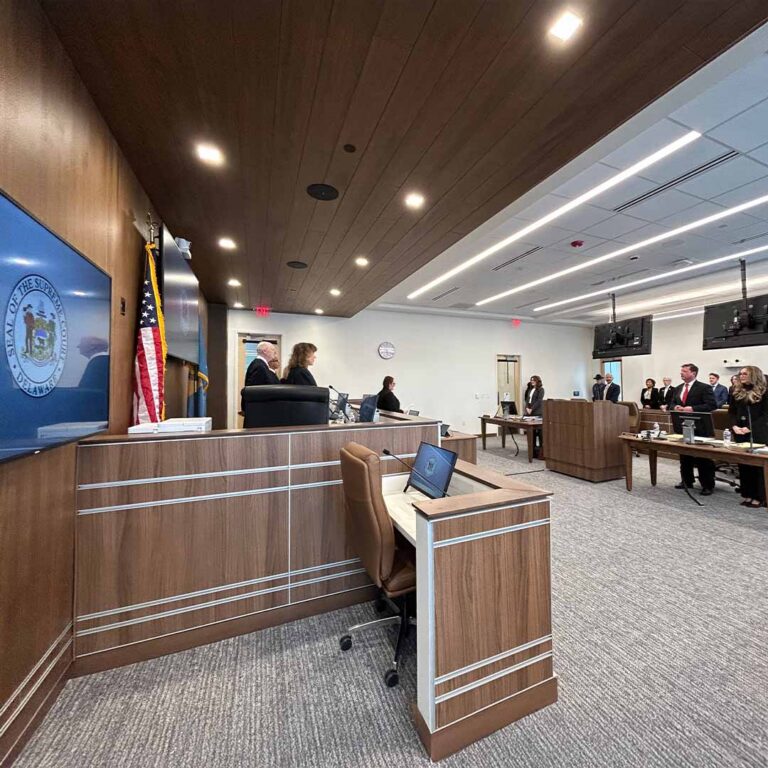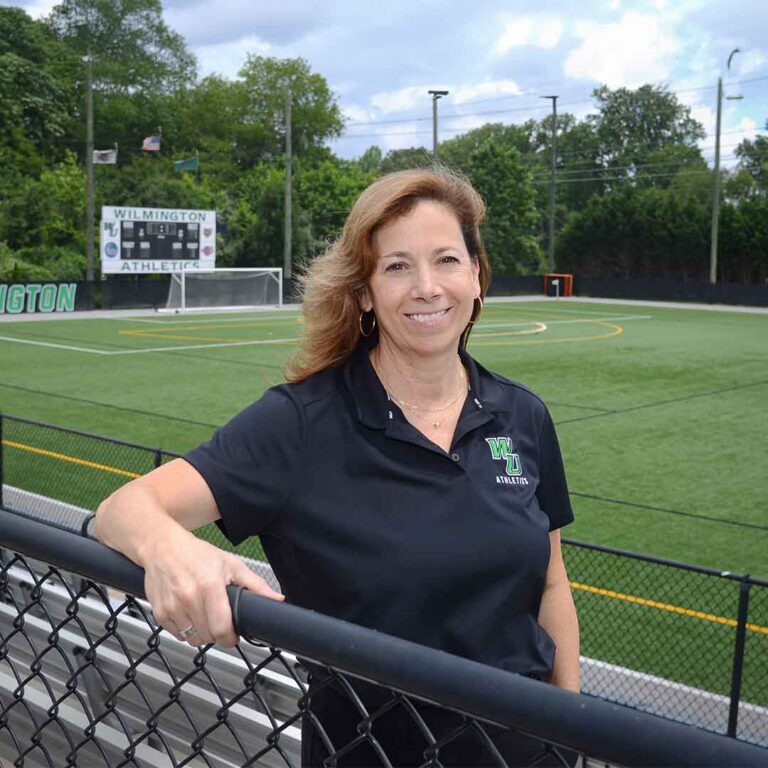Insight for Incyte

A WilmU ESL team proves ‘flexible and nimble’ in developing training for employees of the global corporation.
At this writing, the 2020 football season was in danger of being cancelled because of the coronavirus. If so, Danielle Bergez will hardly notice. The Wilmington University adjunct professor and adjunct program coordinator for TESOL (Teaching English to Speakers of Other Languages) and ESL (English as a Second Language) is simply not a football fan.
That doesn’t mean, however, that she’s not familiar with football terms. The game long ago replaced baseball as America’s favorite sport, and even non-fans, through osmosis, if nothing else, have a smattering of gridiron knowledge. And so, like any resourceful teacher, Bergez used that knowledge when she conducted Wilmington University’s first English for Occupational Purposes (EOP) training program.
Her class was made up of 18 employees from Incyte. Headquartered in Wilmington, Incyte is a global biopharmaceutical company with a strong investment in science and R&D excellence. The company has more than 1,500 employees in the U.S., Canada, Europe and Japan.
In the spring of 2019, Incyte officials contacted WilmU to inquire about EOP training for some of its employees — non-native English speakers “who had expressed interest in honing their language skills,” according to Incyte Human Resources Director Shannon Maroney-Garrett.
“Our HR team researched several programs in the Wilmington area and concluded that Wilmington University most closely matched our needs,” says Maroney-Garrett.
Incyte’s first point of contact was Jeff Martino, director of WilmU’s University Partnership Center. “They knew our history with working with adult learners and they knew about our ability to be flexible and nimble,” he says, “and they wanted a quick turnaround.”
He immediately consulted Bergez and Dr. Matt Wilson, chair of Humanities, First Year Experience, and ESL.
“We offer English for academic purposes, of course, but this was a little bit new,” says Martino. “However, Danielle and Matt said we could take a lot of that learning and translate it for a specific occupation, in this case, the pharmaceutical industry. So we were able to leverage previous programs to develop a new, customized program specifically for Incyte.”
The WilmU team discussed with Maroney-Garrett the goals for the training, then put together a survey that was distributed to managers throughout the company.
Says Bergez: “I used the feedback to create objectives and an overview of the intended content. This was sent to Incyte for approval and to help them promote the training.”
Incyte was onboard quickly. “Their offering was more comprehensive [than competitive programs], and their team was more responsive,” says Maroney-Garrett. “And they were willing to tailor their program to our needs.”
It was agreed that 20 hours of instruction in two-hour segments over 10 weeks would be held at Incyte offices on Augustine Cutoff in Wilmington. Formally titled En-hancing Communication Skills for Non-Native Speakers, the classes began last October. Considering that discussion started in May and this was the University’s first foray into EOP training, that would seem to qualify as “flexible and nimble,” to use Martino’s phrase.
The 18 trainees in the fall program were scientists and researchers with advanced degrees — some with two doctorates — whose native languages included Chinese and Telugu, which is spoken in parts of Southern India. Their facility with English varied. “Some were lower intermediate,” says Bergez, “but others were high advanced, and we had to challenge them.”
She found that the group had no problems with industry-specific language, but they wanted to improve their communication abilities in professional situations, both in written and spoken formats.
Much of the class work focused on what she calls “pragmatic conventions, such as body language, register and tone of voice, turn-taking, direct and indirect communication, and speaking up in meetings. For example, how do you interrupt appropriately?”
Producing speech with minimal pausing and appropriate rate of delivery — often a challenge for non-English speakers — was another goal of the training. Here, class exercises and interaction were key, Bergez says. “We did role play, including dialogues, and mock meetings about a given topic. Sometimes I would put them in small groups, and they would discuss a subject, then come back and report. The whole class joined in a debate about which of two candidates they would hire. They had a chance to agree, disagree, acknowledge another person’s point, and support their opinion with facts.”
It was in some of these exercises that she found a couple of football terms useful. “The idioms were in the context of a business or professional setting,” Bergez says, “such as to ‘kick off’ a meeting or to ‘drop the ball’ on a project.”
She says baseball terminology —hitting a home run and striking out — also cropped up during discussions.
“They seemed to enjoy sports idioms,” Bergez says.
Writing effective emails was another focus of the training — “how to make the email clear and concise, organized and accurate, polite and professional. They analyzed samples, suggested improvements, and wrote practice messages about topics that were relevant to their work situation,” she says.
Talking to Bergez about Incyte training introduces even a professional writer to a whole new vocabulary relating to the English language. There are, for instance, modals —verbs that combine with another verb to indicate mood or tense to express advice or obligation. E.g., “you might want to” versus “you should” versus “you have to.”
The classes also worked on segmentals — pronunciation of specific sounds that can be challenging, such as “th,” and the past tense ending “ed,” which can be pronounced three ways.
And then there were supra-segmentals, which, Bergez explains, “refers to the musical characteristics of speech. For example, intonation is the rise and fall of tone in English. This carries meaning. If you say, ‘what do you mean?’ with the intonation rising at the end, you’re asking a real question, seeking clarification. If the intonation falls at the end, it carries with it the sense of a challenge or disbelief or irritation.”
Among the language nuances the class learned were some idioms used in saying “no” or “I’m too busy” — a somewhat common occurrence in the workplace.
Says Bergez: “We discussed and practiced using expressions like, ‘I’d like to, but I have too much on my plate.’ Also, ‘I’m up to my ears in…reports, work, submissions, etc.’ Note the potential for confusion there. Sometimes, having to refuse or disagree with someone in another language — especially in a work context — can be difficult due to the potential nuance of the language.”
Bergez is quick to credit Beth Kudlick, a TESOL master’s student, who assisted in developing course content. “She created individual, communicative activities such as dialogues,” says Bergez.
The first round of 10 classes began in October and ended in mid-December. Another group of 18 Incyte employees started a second session in the spring of this year. Those classes were conducted by Stephanie Berridge, a current TESOL master’s student who is also chair of WilmU’s Behavioral Science Program.
Midway through the second session the coronavirus shutdown struck, and the University closed (temporarily) on March 17. But the WilmU team reacted quickly, and EOP training resumed less than a month later, this time in online form.
Says Bergez: “Stephanie’s flexibility in making this move online was greatly appreciated, and the participants noted the smooth transition to virtual.”
The team has received positive feedback on the training from both students and Incyte management.
One of the students, Dr. Charlie Xie, a research investigator for Incyte’s Global Pharmaceutical Development, says most of his days are spent in the lab doing formulation and analytical work. “That does not give me much time to talk and improve my English,” he says. “The training helped improve my conversational English, which is very important for daily communication with colleagues and regular teleconferences with research organizations and vendors. Danielle’s lectures were easy to understand, interesting, and helpful. She prepared everything we needed, including binders, printouts and even pens for the classes.”
Dr. Jia Li, a senior research investigator in Global Pharmaco-kinetics, calls the training “a great learning program with excellent, dynamic structure, including different aspects of pronunciation, email writing and meeting communication. The email writing skills I learned from the class are very useful, especially for the current COVID-19 remote work situation.”
As Incyte’s Human Resources director, Maroney-Garrett sat in on many of the classes. “I was impressed with both the in-person and the Zoom format,” she says.
“The Wilmington team had the experience and knowledge and earned the respect of the participants. The team was really a pleasure to work with.”
More classes for Incyte employees are under discussion. “Incyte is rapidly growing, and we’re excited to partner with them,” says Martino.
“The plan is to have offerings again in the fall with the possibility of a second level of training during the same time,” adds Dr. Wilson.
He credits Bergez and the WilmU team for the quick response in developing the University’s maiden voyage into the world of EOP training. “But this is the norm at Wilmington, in my experience,” he says, “and it demonstrates how the University continues to creatively meet the needs of the community around us.”



